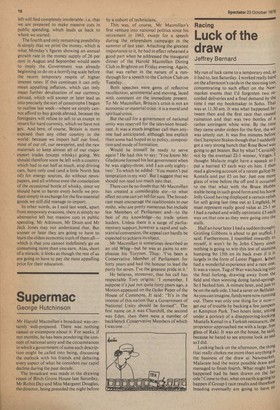Supermac
George Hutchinson
Mr Harold Macmillan's broadcast was certainly well-prepared. There was nothing casual or extempore about it. For weeks, if not months, he has been pondering the concept of national unity and the circumstances in which a government of some such description might be called into being, discussing the outlook with his friends and debating every aspect of what he considers our rapid decline during the past decade.
The broadcast was made in the drawing room of Birch Grove House last Saturday, Mr Robin Day and Miss Margaret Douglas, the director, being preceded the night before
by a cohort of technicians.
This was, of course, Mr Macmillan's first venture into national politics since his retirement in 1963, except for a speech during the referendum campaign in the summer of last year. Attaching the greatest importance to it, he had in effect rehearsed a good part when he addressed the inaugural dinner of the Harold Macmillan Dining Club in Brighton on Friday evening. Again, that was rather in the nature of a runthrough for a speech to the Carlton Club on Tuesday.
Both speeches were gems of reflective recollection, sentimental and moving, laced with comment on the immediate present. To Mr Macmillan, Britain's crisis is not an economic or material crisis: it is a moral and spiritual crisis.
But the call for a government of national unity was reserved for the television broadcast. It was a much lengthier call than anyone had anticipated, although less explicit than some had hoped as to policy, composition and mode of formation.
Would he himself be ready to serve again ? He had this to say: 'You know Mr Gladstone formed his last government when he was eighty-three, and I am only eighty two'. To which he added: You mustn't put temptation in my way'. But I suggest that we should not read too much into that.
There can be no doubt that Mr Macmillan has created a considerable stir—to what effect no one can yet tell for sure. The broadcast must encourage the coalitionists in our midst, who are pretty numerous but include few Members of Parliament and—to the best of my knowledge--no trade union leaders. Unless there is a surge of parliamentary support, however a rapid and substantial conversion, the appeal can hardly be expected to achieve its object.
Mr Macmillan is sometimes described as an old Whig—but he was at pains to emphasise his Toryism. Thus: I've been a Conservative Member of Parliament for forty years and had the honour to lead the party for seven. I've the greatest pride in it.'
He believes, moreover, that his call has respectable Tory origins: remember, suppose it's just not quite forty years ago, a Motion appeared on the Order Paper of the House of Commons. It said: "It's in the interest of this nation that a Government of National Unity should be formed". The first name on it was Churchill, the second was Eden, then there were a number of backbench Conservative Members of which I was one ...'










































 Previous page
Previous page